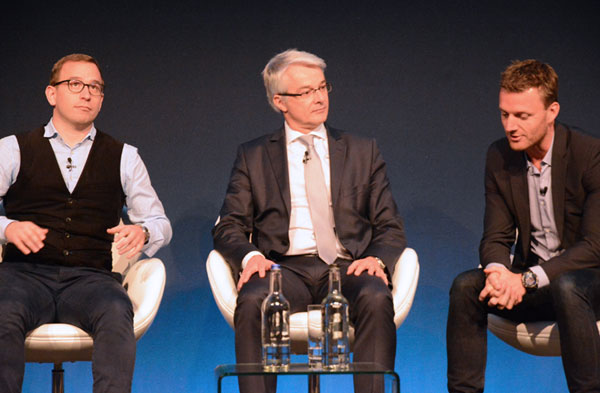✕

Column: industry Tag: Boutique,hotel companies Published: 2017-11-28 14:46 Source: Author:

From left: Florian Kollenz, of 25hours Hotels; Christian Giraud, of AccorHotels, and Charlie MacGregor, of The Student Hotel Group, lead the discussion during the “Revolutionizing hospitality” panel at Deloitte’s European Hotel Investment Conference. (Photo: Terence Baker)
LONDON—C-suite executives of four of Europe’s most innovative hotel companies spoke recently to explain that being boutique for the sake of it will lead nowhere, that differentiation is key as long as any offering is authentic, and that it is important to make sure authenticity is equably applicable to staff as much as to guests.
The first point the panelists who participated in “Revolutionizing hospitality” at Deloitte’s European Hotel Investment Conference agreed on is that the term “boutique” is flung around far too liberally, but the niche is far from dead as long as brands have a definite vision and purpose.
“There is a feeling among some that boutique is hastily made, and at high (average daily rates), but the idea of bringing luxury into boutique is a game-changer as it will introduce service,” said Christopher Norton, CEO, Equinox Hotels.
Charlie MacGregor, CEO and founder of The Student Hotel Group, said investors are more likely to fund projects they believe in, but that’s just the start of developing and sticking with a brand plan.
“Our capital partner invested in us, I believe, because we do have a very strong ‘why,’” he said. “Three hotels in 2014 to 19 today, increasing to 25 to be secured in the next 12 months. We came into it from a student housing market where if you are lucky there is one staff person downstairs for 500 beds upstairs.
“That (investment) allows us to look at things with fresh eyes, but we know private equity will exit its hold. The future is determined by how we will create value but not stifle the original and changing idea.”
The other two panelists—Florian Kollenz, chief development officer of 25hours Hotels, and Christian Giraud, SVP of development, Europe at AccorHotels—now are partners following AccorHotels’ deal to acquire a 30% stake in 25hours Hotels in November 2016.
“A joint venture can be successful if both sides are allowed to concentrate on their own strengths,” Kollenz said. “We would only want to partner with a company with strong networks and infrastructure, to grow internationally and to add to the value proposition.”
To succeed in the boutique space, the panel agreed that hotels require the very best staff.
“And you need the best environment to keep them. You have to be seen to be a change-maker, a sexy group,” Giraud said.
“We have a lot of employees coming to us because of our (corporate social responsibility) policy,” MacGregor said. “I was surprised to hear that, but it is coming more and more.”
Owning design
Differentiating lifestyle brands requires unique design, panelists said, which is a difficult concept when up against alternative-accommodation options and amid all the noise bubbling out of the boutique niche.
“We have the motto ‘You know one, you know none,’ as we saw standardization was over,” Kollenz said. “Airbnb is successful as when you rent an apartment in Tokyo it looks like an apartment in Tokyo.”
He said the boutique space gives hotel owners and designers a blank canvas when refurbishing a property.
“With blank boxes, we can decide what the story will be that we want to tell,” Kollenz said. “We bring in design psychologists, anthropologists, film studio employees, et cetera, to ping pong around ideas, and then it is down to execution.
“There can be a large gap between what it is you want to execute and the necessary level of attention to level.”
Design and meaningful offerings have to play into the mood of the time, the guest desires for interaction and experience, rather than consumption, Norton said.
“That’s important for millennials, who might set the pace, but also for all of us who consider we’re millennials,” he said. “If I have no health, I have no wealth. The youngsters in our office who do not work out once, sometimes twice, a day, they get angry, and the hardest time to maintain that schedule is when you travel.”
Norton reiterated that true differentiation between brands will remain the most difficult task facing executives.
“Equinox’s merging of wellness from our very well-known clubs in a luxury hotel product will be harder for others to replicate,” Norton added.
Giraud said even the legacy brands are taking note.
“Innovation does not come from the sky,” he said. “It is how to be innovative as a company. … You have to take risks, while in the past it was about not making mistakes.”
Norton said operators need excellent relationships with developers, which are crucial in terms of building a successful design that is a hit with guests. The Student Hotel Group’s MacGregor added the ultimate question is to determine the real benefit of innovation to the customer.
The panel finished with some thoughts on how technology-focused design might become the next innovation in the sector.
Artificial intelligence “will come soon into hotels,” Giraud said. “Maybe not in the rooms, but on the distribution side, and it will replace Booking.com, Expedia, and the like. It will know everything about you, even more than technology knows about you now.”
Previous:The ClubHotel Riu Vistamar Reopens in Gran Canaria
Next:Japan’s major hotel markets see sustained demand growth
Hot key words
Hot Products
Popular Vendors